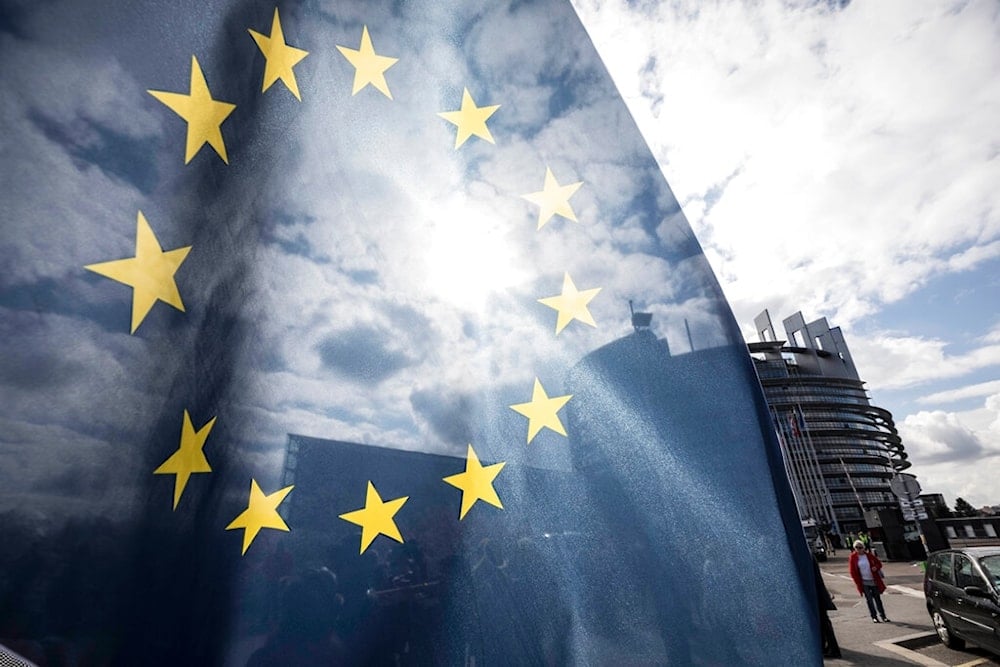EU courts Syria's new leaders to counter Russia's influence: Bloomberg
Moscow's naval port in Tartus and airbase at Hmeimim remain key strategic assets for Russia in the Middle East.
-

An EU flag flies at the front of the European Parliament building in Strasbourg, France, on Tuesday, March 26, 2019. (AP)
Bloomberg on Friday reported that the European Union has ramped up its diplomatic efforts in Syria, sending German and French foreign ministers to engage with the country's new leadership.
The visit by Germany's Annalena Baerbock and France's Jean-Noël Barrot marks the highest-level European delegation to Syria since the ousting of President Bashar al-Assad last month by Hay'at Tahrir al-Sham (HTS), an group led by new regime forces leader Ahmed Al-Sharaa.
Baerbock and Barrot are meeting with Al-Sharaa in Damascus, with the EU aiming to support "an inclusive, peaceful transfer of power" and assist with reconstruction. "It will be a rocky road," Baerbock acknowledged.
HTS Leadership Raises Concerns
HTS, which has not yet established control over all of Syria, faces skepticism due to its past affiliation with al-Qaeda, a connection it allegedly severed in 2016, though it continued to preserve the same ideology.
While the group claims to have moderated its stance, its designation as a terrorist organization remains unchanged by the US, EU, and UK.
Even as the United States recently removed a $10 million bounty on Al-Sharaa, concerns persist about the group's governance and long-term stability in the region.
Baerbock stressed that any progress must include broad representation. "There can only be a new beginning if the new Syrian society gives all Syrians, women and men, regardless of ethnic or religious group, a place in the political process, grants rights, and offers protection," she said in a statement.
Refugee Returns
Germany has an additional stake in stabilizing Syria. Baerbock hopes the new leadership will create conditions allowing some of the one million Syrians who sought refuge in Germany under Assad's regime to return safely.
Read more: More than 30,000 Syrians return home: Turkiye
Since taking power, HTS has sought to reassure non-Muslim communities of their rights and freedoms.
Baerbock acknowledged the group's controversial history, stating, "We know where HTS comes from ideologically, what it has done in the past. Despite all the skepticism, we must not miss the opportunity to support the people of Syria at this important crossroads."
Russian Influence
The EU has also used the opportunity to urge Russia to withdraw its military presence from Syria. Moscow's naval port in Tartus and airbase at Hmeimim remain key strategic assets for Russia in the Middle East.
Talks between HTS and Moscow suggest the Kremlin may seek to maintain its foothold, though Baerbock called for their exit, arguing, "The Syrian people will not forget the massive bombings and human rights violations."
According to the report, Russia's reduced influence in Syria would represent a blow to President Vladimir Putin, as it would complicate Moscow's military operations in the Middle East and Africa.
Baerbock accused Russia of shielding Assad's government from accountability during the war on Syria, saying, "Germany and its international partners are also committed to ensuring that the internal Syrian process is not disrupted from outside."
Read more: Russia must exit Syria for EU to lift sanctions on HTS: Dutch FM
Widening Regional Implications
In a related development, Ukraine has expressed interest in re-establishing diplomatic ties with Syria. Relations were severed in 2022 after al-Assad aligned with Russia during its invasion of Ukraine.
Ukrainian President Volodymyr Zelensky stated on Thursday that he hopes for renewed engagement with Syria in light of recent changes.

 4 Min Read
4 Min Read








